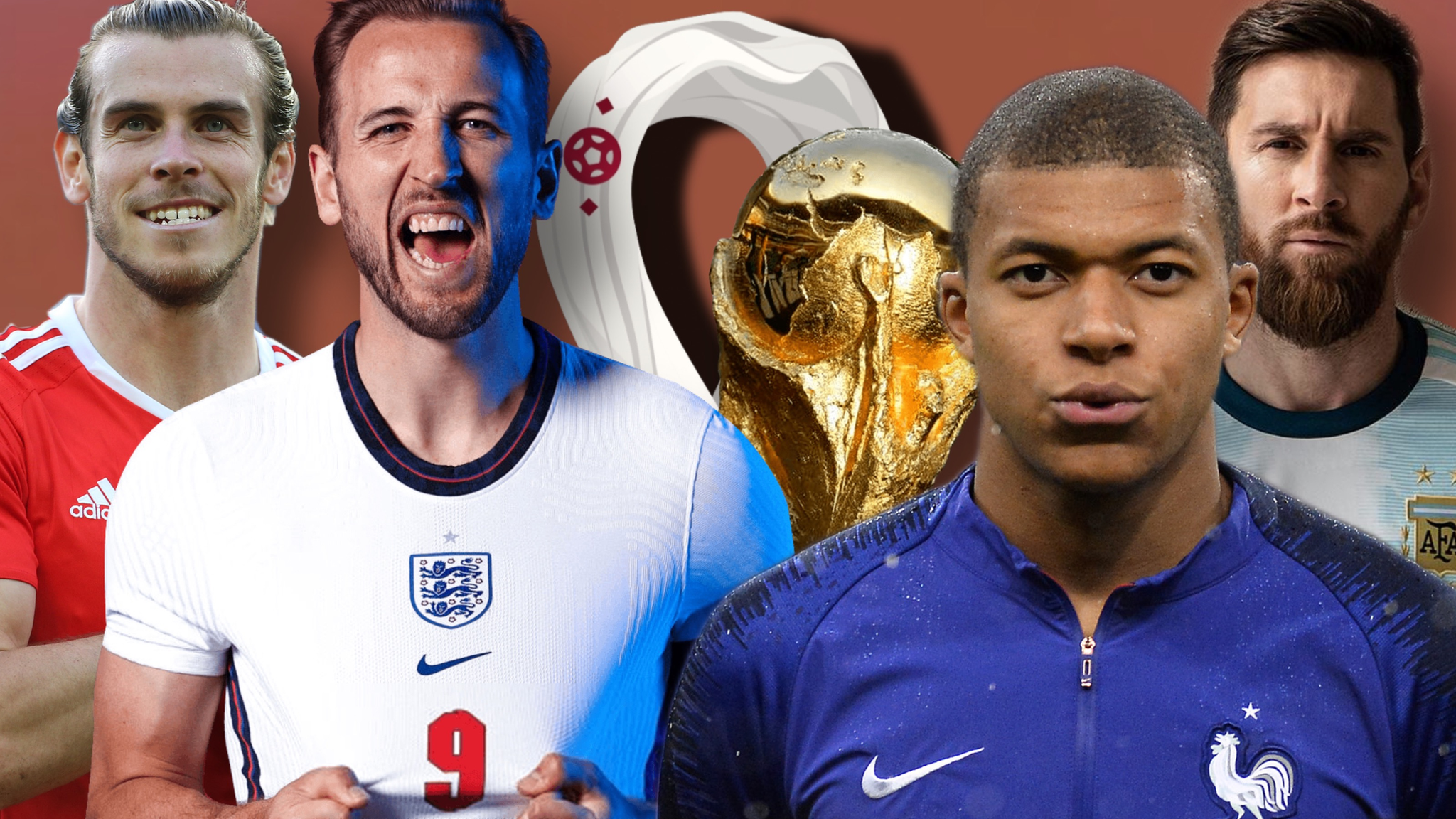World Cup 2022: Why is the World Cup in Qatar so controversial?
- Published
- comments
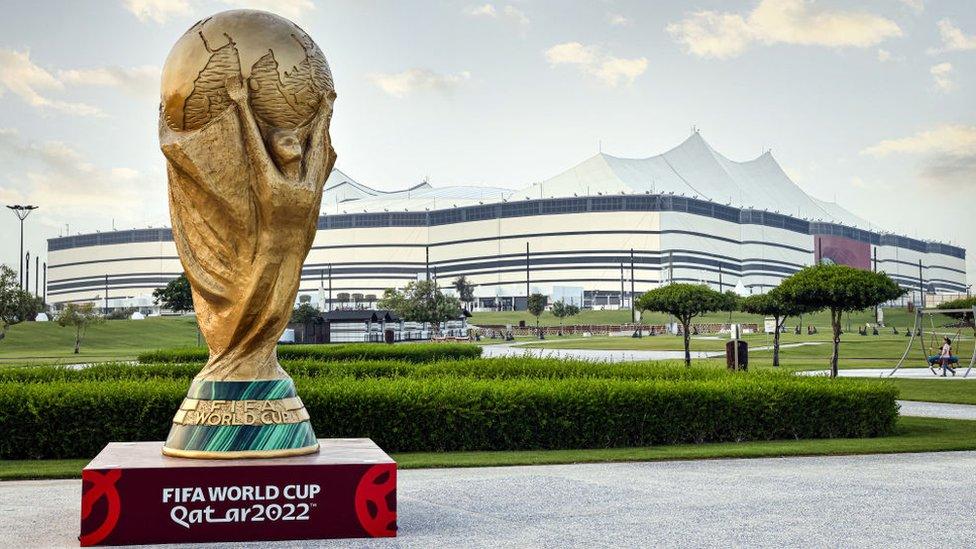
More than one million fans will travel to Qatar as the Fifa World Cup kicks off for 29 days of football on 20 November.
But before a ball has even been kicked, the World Cup in Qatar has been surrounded in controversy, which began 12 years ago when the world's biggest football tournament was awarded to the country.
World Cup: Why are some people unhappy about Qatar hosting?
Human rights in Qatar
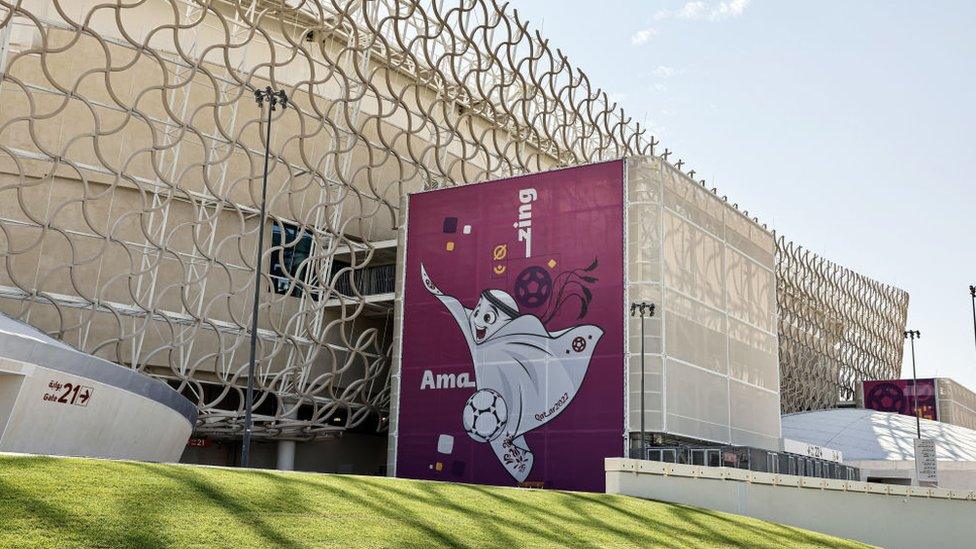
Qatar, which follows strict Muslim laws, has been criticised for its human rights record.
In the country, women are heavily restricted in what they are allowed to do and it's also illegal to be in a gay relationship.
Preparation for the World Cup has also seen concerns over the treatment of workers from abroad in the country.
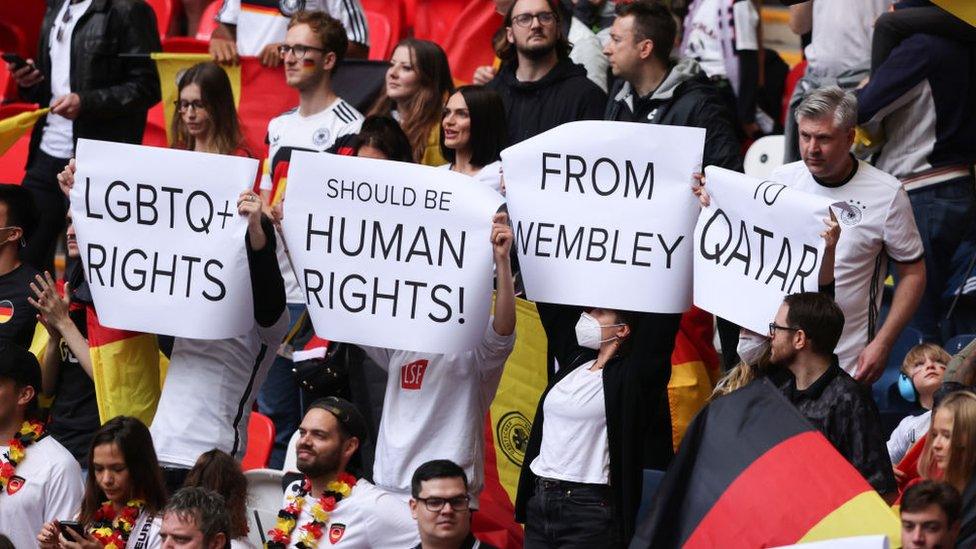
German fans protest for human rights and against Qatar during Euro 2020 at Wembley last year
It's expected that several teams, players and fans will protest against Qatar's human rights record during the tournament, prompting Fifa to write to all 32 national teams competing at the World Cup telling them to "now focus on the football".
In response Amnesty International, which campaigns on human rights issues, said: "There's never been a right time to talk about human rights issues in Qatar as far as they [Fifa] are concerned.
"Now is the time to apply pressure on these issues. Once the World Cup rolls out of town, are we still going to be having conversations about Qatar? I don't think we are."
Ten European football associations - including those of England and Wales - said "human rights are universal and apply everywhere".
LGBTQ+ rights in Qatar

Gay relationships are banned and against the law in Qatar and gay, lesbian, and transgender people in the country face fines, time in prison or even the death sentence.
The World Cup's organisers say "everyone is welcome", and claim no one will be discriminated against.
But chief executive Nasser al Khater said there will not be a change to the country's laws during the tournament and asked visitors to still "respect our culture".
He has said that in Qatar any public displays of affection such as kissing between couples - whether gay or straight - is also culturally inappropriate.
Meanwhile the captains of several World Cup teams including England's Harry Kane and Wales' Gareth Bale will wear a rainbow 'one love' armband during the tournament in support of the LGBTQ+ community.
Treatment of migrant workers
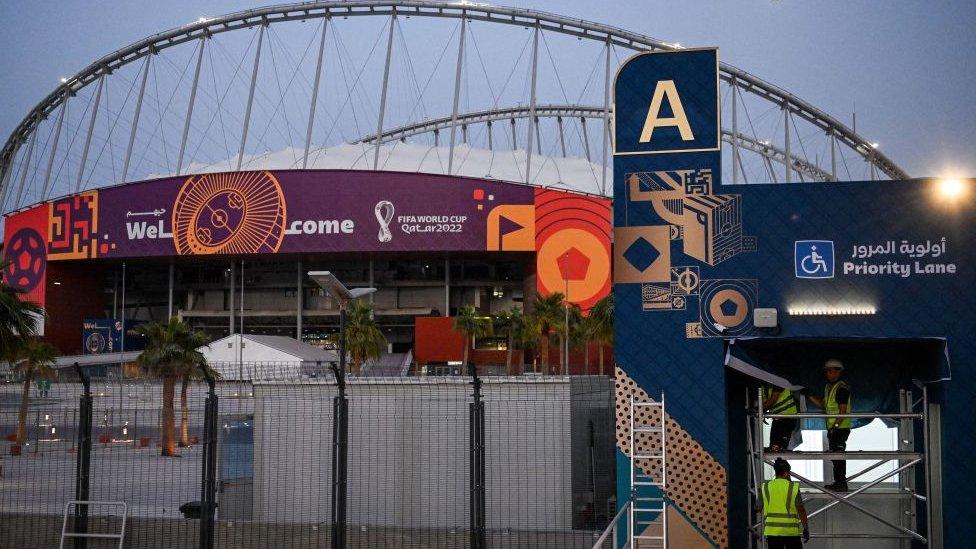
An entrance of the Khalifa Stadium in Doha
Those working on construction ahead of the World Cup in Qatar have mostly been from outside of the country.
Roughly 30,000 people from countries such as India, Bangladesh, Nepal and the Philippines have been building seven new stadiums from scratch, as well as new hotels and roads in the country.
Qatar's labour laws known as the 'kafala system' allow businesses or business owners in Qatar to take workers' passports and stop them leaving the country.
Human Rights organisations such as Amnesty International say that as a result, since 2010, hundreds of thousands of these workers have faced human rights abuses and exploitation in difficult working conditions with little pay.
Qatar says its kafala system has been partially dismantled and allegations of human rights abuses are unfair.
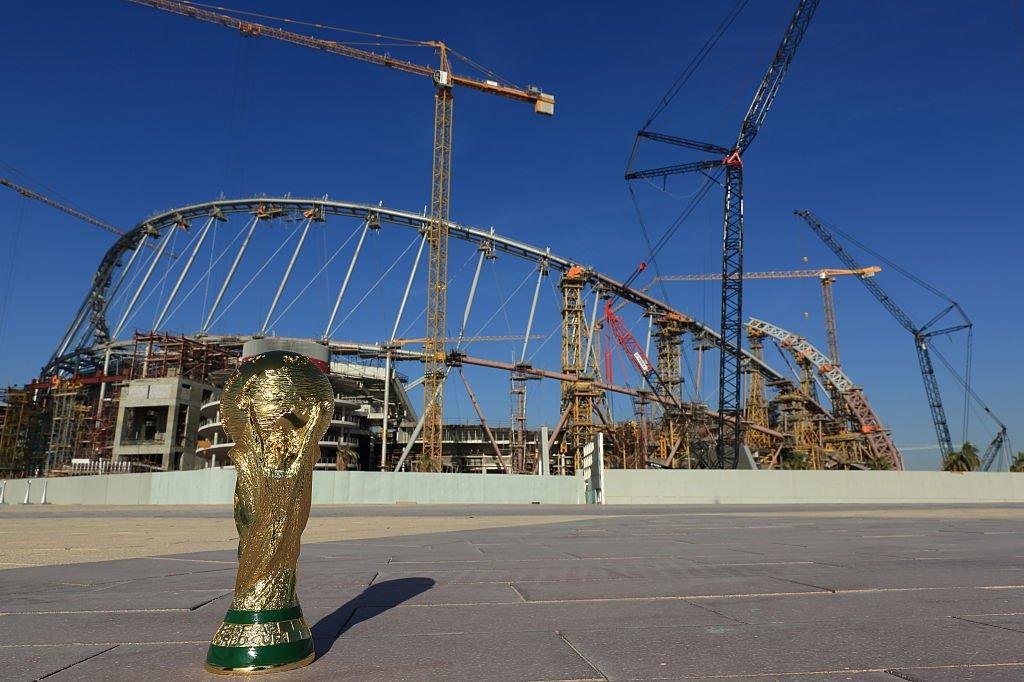
Cranes and building works during the construction and refurbishment of the Khalifa International Stadium
However, the Guardian newspaper claims that figures show more than 6,000 workers have actually died in Qatar since it won its World Cup bid 12 years ago.
The Qatar government said that total is misleading, and that between 2014 and 2020, there were 37 deaths among workers at World Cup stadium construction sites, and only three were "work-related".

Denmark will wear "toned down" jerseys for the World Cup to protest against Qatar's human rights record and treatment of migrant workers
Australia became the first team competing at the tournament to release a statement criticising Qatar on human rights, saying the "suffering" felt by migrant workers and their families caused by the tournament "cannot be ignored".
European team Denmark will wear "toned down" shirts during the tournament in protest against the country, with kit provider Hummel saying it "does not wish to be visible" in a tournament it claims "has cost thousands of lives".
World Cup organisers say that "protecting the health, safety, security, and dignity of every worker contributing to this World Cup is our priority".
The tournament's organising committee says the World Cup has allowed Qatar to make progress on issues related to worker rights but there remains gaps in the country's labour system.
Environmental impact
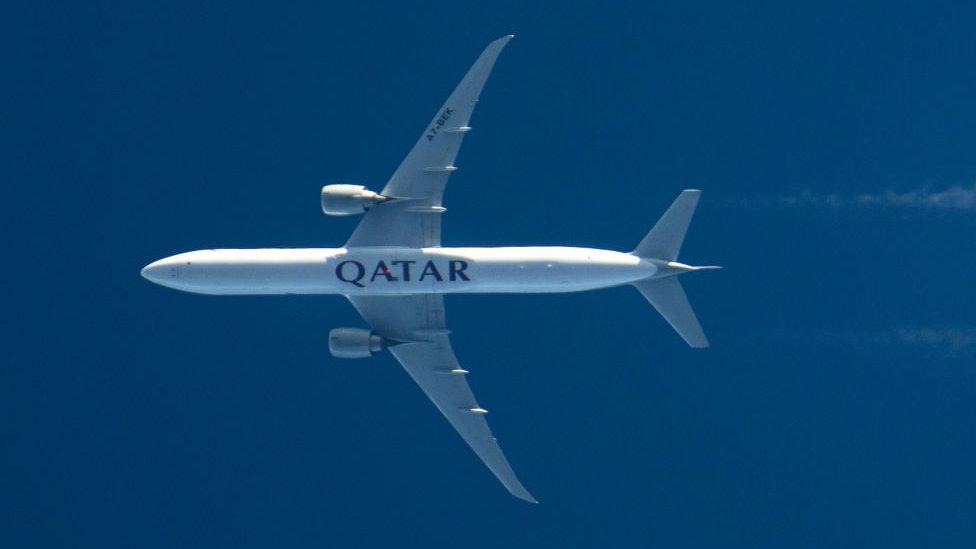
World Cups generally produce high amounts of pollution due to the construction of stadiums, hotels and all that air travel by teams and fans.
Fifa has said that this year's tournament in Qatar will be the first-ever carbon-neutral World Cup - a claim that has been described as "dangerous and misleading" with calls for it to be dropped by critics.
Carbon neutral means that the amount of carbon dioxide (CO2) it releases into the atmosphere is the same amount as it takes out. Carbon dioxide (CO2) is a major cause of climate change.
Qatar's plan to reduce World Cup emissions involve something called carbon offsets or carbon credits, which are ways to cancel out or absorb the same amount of carbon produced - so that it's as if the tournament had emitted nothing.
Fifa says the Qatar World Cup will have a carbon footprint - the amount of carbon produced - of 3.6 million tonnes.
More than half of that Fifa says will be caused by emissions from travel, including fans' flights, which the organisation has promised to offset.
In theory, that would mean every mile flown into the country and every construction project related to the World Cup would be countered by an equal amount of carbon dioxide reduced by improvements made elsewhere.
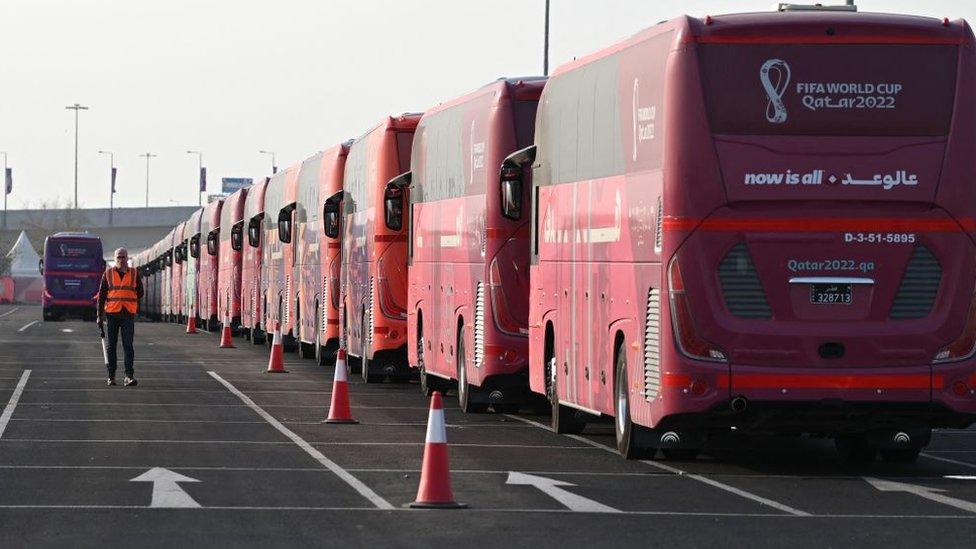
Buses will transport fans to stadiums in Qatar
Among Fifa's plans for the tournament are "energy efficient stadiums" and "low emission transportation" such as electric buses.
But Mike Berners-Lee from Lancaster University has been looking at pollution estimates for the World Cup and believes it will be much higher than predicted.
"We did a little digging into Fifa's carbon footprint estimate and we think it's way over 10 million tonnes - so three times that, at least."
How did Qatar get the World Cup?
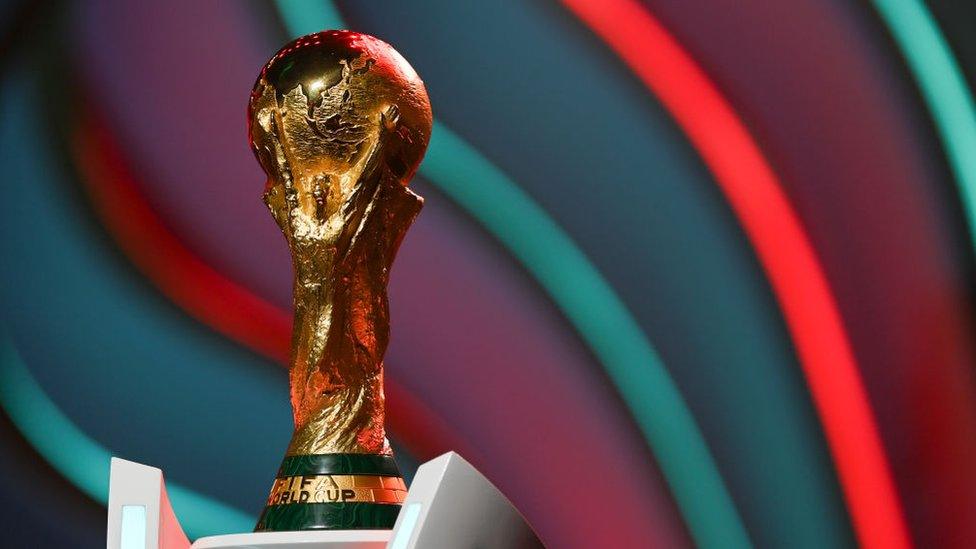
The Qatar World Cup is the first to be held in the Middle East in the tournament's 92-year-history and the first during winter.
Qatar won the bid for the 2022 Men's World Cup in 2010 beating other countries hoping to host the tournament including their closest rival, the USA, by 14 votes to eight.
It was a big surprise at the time and the awarding of the World Cup to Qatar saw investigations over how the decision was made with allegations of corruption (which means being dishonest in a position of power) and bribery (which is an attempt to make someone do something for you by giving them something they want, like money).
British newspaper the Sunday Times published documents that the paper claimed showed how a Qatari businessman named Mohamed bin Hammam - a former Fifa vice president - had paid millions of pounds to football officials around the world to secure the World Cup for Qatar.
In response, Fifa began its own investigation into the bidding process and eventually cleared Qatar of corruption allegations - but admitted that there had been "potentially problematic conduct of specific individuals" as part of the Qatar 2022 bid.
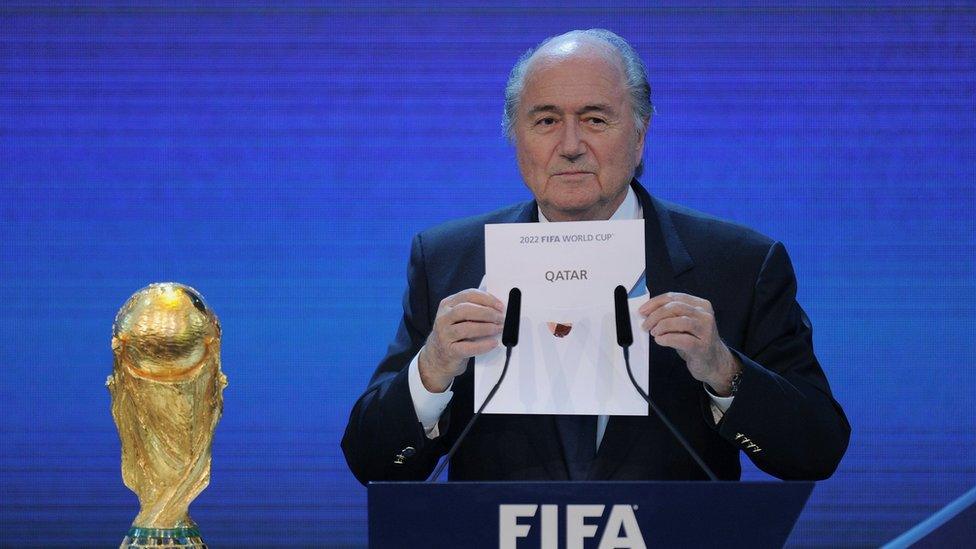
The then Fifa president Sepp Blatter revealing Qatar as 2022 World Cup hosts in 2010
Fifa stands for (in French) Fédération Internationale de Football Association - or the International Federation of Association Football.
It runs world football and is in charge of organising and promoting big football tournaments around the globe - the biggest and most famous being the World Cup.
Recently, Sepp Blatter, who was president of Fifa when Qatar was awarded the World Cup, admitted that the decision to give the country the tournament was a "mistake".
Blatter, once one of the most powerful figures in world football, was also the subject of several accusations of corruption during his 17 years in charge at Fifa.
He was eventually forced to quit in 2015 over allegations that he broke the law while arranging for £1.6m (unrelated to the World Cup) to be paid to former Uefa president Michel Platini, who was also forced to resign from his position at Fifa.
Both men were cleared of fraud in court earlier this year.
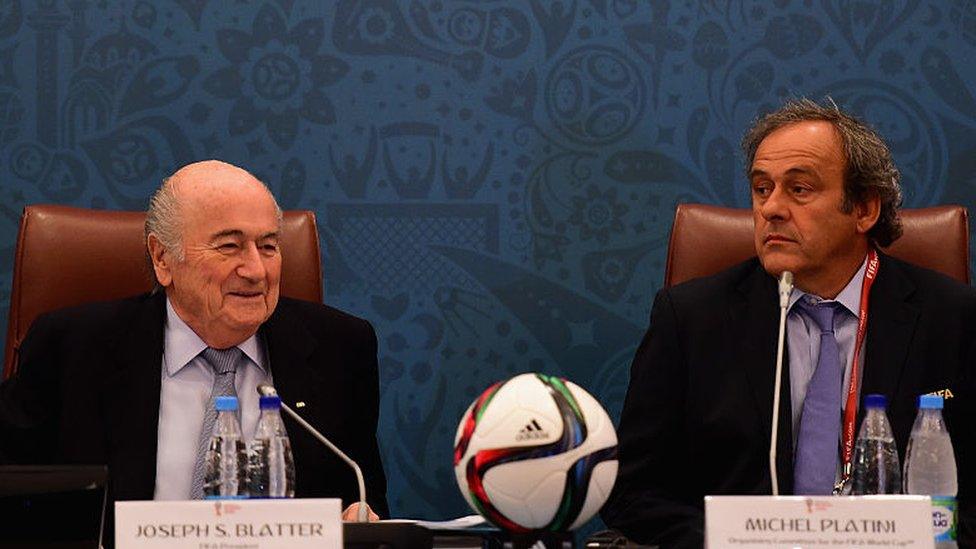
Both Sepp Blatter (left) and Michel Platini's (right) time in charge of Fifa and Uefa has been surrounded in controversy
Speaking about the World Cup bidding process, Blatter has accused Platini of swaying the vote in favour of Qatar in 2010, saying he was pressured to do so by the then French president, Nicolas Sarkozy.
"Thanks to the four votes of Platini and his [Uefa] team, the World Cup went to Qatar rather than the United States. It's the truth," he said.
Platini was questioned by French officials in 2019 as part of an investigation into the 2022 World Cup bidding process. But Platini, who played for France as a footballer, denied his votes were influenced.
Both Blatter and Platini are currently banned from involvement in any football related activities by Fifa.
- Published18 November 2022
